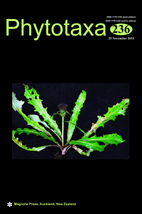Abstract
The tropical cucurbitaceous genus Zehneria as traditionally circumscribed displays much morphological diversity. Recent taxonomic revisions have resulted in its redefinition through both recognition and subsequent lumping of several additional genera. This study utilized plastid and nuclear DNA sequence data to reconstruct a molecular phylogeny of Zehneria and its close relatives in order to test whether these revisions reflected the molecular evolution in this group. The results suggest that Neoachmandra is monophyletic, and that Zehneria in a restricted sense and Neoachmandra accessions form a single monophyletic clade, whereas Pilogyne in its present understanding is polyphyletic. In the light of these results Pilogyne should be merged back into Zehneria from which it was split off earlier.

